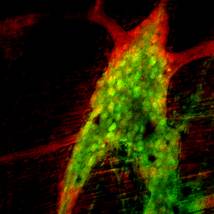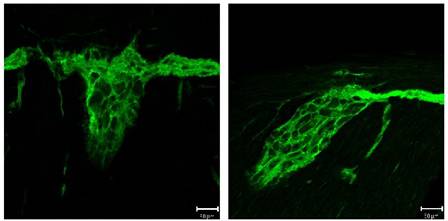David A. Taylor, Ph.D.
 Professor and Chair
Professor and Chair
Email: taylorda@ecu.edu
Voice: 252-744-2734
Education
- Ph.D. West Virginia University
- B.S. Alderson-Broaddus College
Research Interests

 The laboratory is involved in studies of the cellular and molecular mechanisms by which adaptive changes in the sensitivity of excitable tissues to drugs and neurotransmitters are produced. In particular, studies are focused upon the role of such differences in sensitivity in the development of tolerance to drugs and as contributors to pathologic conditions like epilepsy. These questions are being addressed using a battery of pharmacological, biochemical, molecular and electrophysiological methodologies. Pharmacological methods employed by the laboratory involve construction and analysis of dose- or concentration-response curves in vitro. In addition, a number of biochemical and molecular techniques are used including receptor binding assays, second messenger assays and quantitative protein analysis via Western blot and slot blot techniques with chemiluminescence detection as well as RT-PCR and immunohistochemical and in situ hybridization studies. Electrophysiological techniques include extracellular recording, microinotophoresis, intracellular recording and whole cell and single ion channel patch clamp recording in a variety of neural preparations including brain slices in vitro.
The laboratory is involved in studies of the cellular and molecular mechanisms by which adaptive changes in the sensitivity of excitable tissues to drugs and neurotransmitters are produced. In particular, studies are focused upon the role of such differences in sensitivity in the development of tolerance to drugs and as contributors to pathologic conditions like epilepsy. These questions are being addressed using a battery of pharmacological, biochemical, molecular and electrophysiological methodologies. Pharmacological methods employed by the laboratory involve construction and analysis of dose- or concentration-response curves in vitro. In addition, a number of biochemical and molecular techniques are used including receptor binding assays, second messenger assays and quantitative protein analysis via Western blot and slot blot techniques with chemiluminescence detection as well as RT-PCR and immunohistochemical and in situ hybridization studies. Electrophysiological techniques include extracellular recording, microinotophoresis, intracellular recording and whole cell and single ion channel patch clamp recording in a variety of neural preparations including brain slices in vitro.
Publications
Malanga, C.J., Meng, J., Fleming, W.W. and Taylor, D.A.: Chronic morphine treatment of guinea pigs induces non-specific changes in the nucleus tractus solitarius in vitro. J. Pharmacol. Exp. Ther. 280:16-23, 1997.
Kong, J.-Q., Leedham, J.A., Taylor, D.A. and Fleming, W.W.: Evidence that tolerance and dependence of guinea-pig myenteric neurons to opioids is a function of altered electrogenic sodium-potassium pumping. J. Pharmacol. Exp. Ther. 280:593-599, 1997.
Meng, J., Malanga, C.J., Taylor, D.A. and Fleming, W.W.: Hyperpolarizing effect of morphine, clonidine and 2-chloroadenosine in myenteric neurons associated with tolerance to morphine. J. Pharmacol. Exp. Ther. 281:41-47, 1997.
Mahaney, J., Felton, C., Taylor, D., Fleming, W., Kong, J-Q. and Baylis, C.: Renal cortical Na+, K+-ATPase activity and abundance is decreased in normal pregnant rats. Amer. J. Physiol. 275 (Renal Physiol. 44): F812 – F817, 1998.
Caveney, S.W., Taylor, D.A. and Fleming, W.W.: Examination of the a1-adrenoceptors in the mesenteric arterial vasculature during the development of salt-sensitive hypertension. Naunyn-Schmiedeberg Arch. Pharmacol. 356:374-382, 1997.
Caveney, S.W., Culhane, J.M., Taylor, D.A. and Fleming, W.W.: Preparation and application of an isolated superior mesenteric arterial vascular preparation. J. Cardiovasc. Pharmacol. 32:721-727, 1998.
Molnar, L.R., Thayne, K.A., Fleming, W.W. and Taylor, D.A.: The role of the sodium pump in the developmental regulation of membrane electrical properties of cerebellar Purkinje neurons of the rat. Dev. Brain Res. 112:287-291, 1998.
Biser, P., Kong, J.-Q., Fleming, W.W. and Taylor, D.A.: Quantification of the a3 subunit of the Na+, K+-ATPase in cerebellar Purkinje neurons using chemiluminescence in Luminescence Biotechnology; Instruments and Applications, ed. by K. Van Dyke, CRC Press LLC, Boca Raton, 2001.
James-Walke, N. L., Williams, H. L., Taylor, D. A. and McMillen B. A., Periadolescent nicotine exposure produces sensitization to reinforcement by diazepam. Neurotoxicol. & Teratol. 29:31-36, 2007. Soderstrom, K., Qin, W., Williams, H., Taylor D.A., McMillen B.A., Nicotine increases FosB expression within a subset of reward- and memory-related brain regions during both peri- and postadolescence, Psychopharmacology (Berl.), 2007, 191(4): 891-897
Li, P., Maguma, H.T., Thayne, K., Davis, B. and Taylor, D.A., Correlation of the time course of development and decay of tolerance to morphine with alterations in sodium pump protein isoform abundance. Biochem. Pharmacol. 2010, 79:1015-10224.
Laboratory Members
| Name | Title | Building/Room | Phone |
|---|---|---|---|
| Jackie McKeel | Research Specialist | BSOM 6S-16 | 252-744-2738 |
| Alexis Papariello | Graduate Student | BSOM 6S-16 | 252-744-2738 |